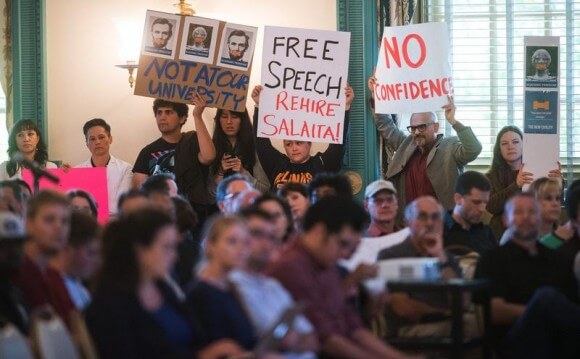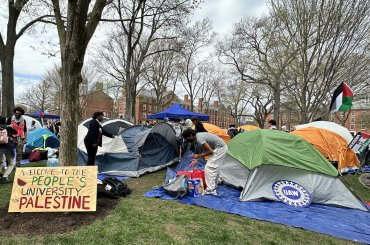In an otherwise excellent recent article exploring the various ways that the University of Illinois at Urbana-Champaign (UIUC) violated the law in rescinding its offer to Dr. Steven Salaita for his impassioned Twitter posts opposing Israel’s latest Gaza War, Law Professor Michael C. Dorf writes:
The case is rich in irony and apparent hypocrisy on both sides. Less than a year ago, Illinois Chancellor Phyllis Wise reaffirmed the university’s commitment to academic freedom as a “core principle” in touting “the critical importance of the ability of faculty to pursue learning, discovery and engagement without regard to political considerations.” That statement was issued to explain why the university opposed an academic boycott of Israeli institutions. Salaita, for his part, has been an outspoken supporter of that boycott.
Nonetheless, Salaita’s case is—or should be—relatively easy. Academic freedom and freedom of speech protect all viewpoints, even those that are hostile to academic freedom or freedom of speech.
The argument, oft repeated, is that Dr. Salaita’s writings in support of an academic boycott of Israeli institutions violate the very principles of academic freedom, which he now seeks to invoke to defend himself.
This argument fundamentally misunderstands the academic boycott of Israeli institutions. In fact, all you have to do to realize this, is to take a look at the ongoing response of academics across disciplines to UIUC’s unjust, unwarranted, and probably illegal firing of Dr. Salaita.
As of this writing, over 5000 scholars have committed not to give lectures, participate in conferences, or visit UIUC until they reverse their decision to fire Dr. Salaita. As explained in the largest of these statements, the boycott of UIUC is motivated by the principle that:
academic freedom and the protection of First Amendment rights to free speech, and a commitment to fairness and transparency in all academic procedures and practices, including faculty hires and other labor practices, form the foundations of the American public higher educational system
The logic here is simple. Academic freedom is a bedrock principle that must be honored by any university as part of its mission of furthering research and education. If an academic institution should violate this sacred trust, scholars will respond by refusing to participate in the life of the university. Put otherwise: the firing of Dr. Salaita is not business as usual and we will not conduct business as usual with UIUC until they repair this basic social wrong.
As with all boycotts, UIUC will suffer as a result. Students and faculty at UIUC, although they are not personally subject to the boycott, will have fewer opportunities to interact with world-class scholars, participate in the free exchange of ideas, and participate in the sorts of conferences which are the lifeblood of great universities. These consequences, unfortunate though they may be, are not just the collateral cost of any successful boycott. They are the means by which individual scholars can exert pressure on institutions and policies. Refusing to collaborate with UIUC while it blatantly violates First Amendment rights and principles of shared governance is therefore not a violation of academic freedom. It is the logical response by those committed to this basic ethical principle.
The academic boycott of Israeli universities follows a similar logic. The boycott was launched by a group of Palestinian intellectuals and scholars in 2004. It is one component of the larger call from over 170 Palestinian civil society organizations to boycott, divest from, and enact sanctions against Israel in response to its repeated violations of Palestinians basic human rights. The academic boycott asks scholars not to collaborate with Israeli academic institutions, though they remain free to collaborate on research and writing projects with individual Israeli scholars, so long as they do not represent the state of Israel or a complicit organization. (PACBI’s recently revised guidelines can be viewed here).
An academic boycott, responding to the call from Palestinian civil society groups, targets Israeli universities for their direct complicity in the ongoing occupation of Palestine and their active contributions in violating the basic human rights. Israeli institutions are complicit in at least three ways:
First, Israeli academic institutions participate directly in the occupation. Some, like Ariel University and parts of Hebrew University in Jerusalem are built directly upon occupied Palestinian lands. Others, like Tel Aviv University, Ben Gurion University, or the Technion develop the technological capacities and military doctrines that are used in the occupied Palestinian territories. Finally, some institutions – most notably the Interdisciplinary Center in Herzilya – have set up programs where students gain course credit for defending the state’s wars and policies to an increasingly skeptical public. Amongst the targets of these doctrines and technologies are Palestinian universities, which have been regularly targeted by the Israeli state.
Second, Israeli academic institutions actively discriminate against their own Palestinian students. All Israeli universities provide preferential admissions, scholarship, and even housing to those who have served in the army. Because the vast majority of Palestinians do not do military service for the self-avowed “Jewish State,” they are de facto discriminated against at all educational levels.
Finally – and most relevant when comparing the academic boycott of Israel to that of UIUC – Israeli universities regularly retaliate against those who express dissenting viewpoints. To give one recent example: During the latest Gaza War, Ariel University (located in an illegal settlement) fired Dr. Amir Hetsroni, immediately after he published an op-ed in Haaretz criticizing Israeli universities for retaliating against those who did not support the war. At the same Bar-Ilan University took no disciplinary action against Prof. Mordechai Kedar who argued that Palestinian “terrorists” would be deterred is if their mothers and sisters were raped.
The parallels with recent events in southern Illinois are so striking that Dr. Juan Cole (a professor of history at University of Michigan and the author of a popular blog) has dubbed Dr. Hetsroni “the Israeli version of Steven Salaita”. But in the Israeli case, the response of the university has been even more despicable. Following his firing, the Chancellor of Ariel University did not hide behind the “civility defense,” as his counterpart at UIUC did. Instead, he simply declared that any and all students or faculty who participate in his university must “confirm [their] loyalty to the state.” At Ariel University, academic freedom is granted only to those who can pass this McCarthyism test.
This is no isolated incident: During the Gaza war, universities suspended students and withdrew scholarships from those who criticized the state on their own Facebook pages. Nor is this a particularly recent phenomenon. In the past, Israeli universities have canceled student events, arrested peaceful student demonstrations, and prevented scholars from participating in conferences all due to their dissenting political views. Politicians even came close to shutting down the entire Department of Government and Politics at Ben Gurion University over the political views of its professors. The department narrowly avoided this fate, but only after it agreed to alter its curriculum and hire “state friendly” researchers to mollify its critics. It is no exaggeration to say that there are hundreds, perhaps even thousands of Salaitas in Israel today. Thus, while some Israeli scholars have been strong critics of Israel, universities have repeatedly moved to censure and discipline dissent.
A boycott of Israeli institutions is not the sort of action that we call for lightly. Yet the participation of Israeli universities in violating the basic human, educational, and academic rights of Palestinians and their allies leaves us no other choice. The consistency and gravity of these offenses require an immediate and effective response. We can and should work with the few individual Israeli academics who oppose their universities’ and their state’s ongoing crimes. For example, see this recent statement by Israeli anthropologists who also defend the right of other anthropologists to discuss an academic boycott. Some Israeli scholars have also publically supported an academic boycott. But formally collaborating with these institutions can only serve to legitimize their illegitimate actions and policies. Until those policies change, we cannot allow ourselves to conduct business as usual. Whether in Urbana-Champaign or in Palestine-Israel, academic freedom must extend to all, regardless of their ethnicity or political beliefs.
Opponents of the academic boycott like to pretend that BDS supporters target Israeli universities for crimes that are beyond their control. Yet nothing could be further from the truth. As long as Israeli academic institutions participate in the illegal occupation of Palestinian territory, discriminate against Palestinian students, and punish those who would dissent, they too must be boycotted. Academic freedom must apply to all. When an institution – be it UIUC or the Israeli university system – blatantly violates this principle, it is not only our right but it is the duty of all who believe in academic freedom to pressure these institutions to uphold the basic ethics of any scholarly institution. Doing so is a defense of, not an attack on, academic freedom.



As David Sheen and Richard Silverstein pointed out, another Bar-Ilan professor, Hillel Weiss, recently called for genocide of the Palestinians. The university’s reaction is reported by Haaretz:
So the call for genocide is brushed off by university administration because it was made on Facebook.
“A boycott of Israeli institutions is not the sort of action that we call for lightly. Yet the participation of Israeli universities in violating the basic human, educational, and academic rights of Palestinians and their allies leaves us no other choice.”
The UIUC evidently thinks there is another choice — civility (= passivity). UIUC governors want to be allowed to do their corporate-style will unhindered and any and all hindrance is dubbed uncivil and, if they can do so, punished. Thus Salaita.
The boycott of UIUC is a beautiful example of why boycott is exactly the proper way for academics to treat academies which don’t conform to academic standards.
I keep having a hard time finding this liberal democracy that Senator Warren was speaking of in such glowing terms recently.
Powerful institutions tend to use that power to protect what they deem to be their interests, unless forced to do otherwise. The BDS movement directly links Israeli actions to consequences — something that does not usually occur otherwise.
Great article illustrating the need to keep up the pressure on all fronts.
“Whether in Urbana-Champaign or in Palestine-Israel, academic freedom must extend to all, regardless of their ethnicity or political beliefs.”
This is wrong. Israeli academics do not have academic freedom, because they are part of a nation that commits genocide and crimes against humanity. When institutions commits acts we disagree with, all employees of that institution lose their academic freedom immediately. That is the whole logic behind PACBI. Professor Salaita, of course, retains his academic freedom, because the nation he is part of has never committed any crimes at all.
Right, boycott them all. Not just Israeli and American academic institutions but all scholars that refuse “to see the light”. Never read a mathematical paper from a mathematician or use a cancer treatment invented by a medical professor from that ignominious group. Palestine over bogus scholarship!